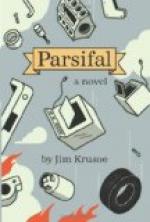|
This section contains 9,025 words (approx. 31 pages at 300 words per page) |

|
SOURCE: Ziolkowski, Theodore. “Wagner's Parsifal between Mystery and Mummery; or, Race, Class, and Gender in Bayreuth.” In The Return of Thematic Criticism, edited by Werner Sollors, pp. 261-86. Cambridge, Mass.: Harvard University Press, 1993.
In the following essay, Ziolkowski provides background to Wagner's opera Parsifal and makes a thematic analysis of its libretto, while noting the “racist, sexist, and elitist” assumptions of the text.
In the century since its premiere Wagner's Parsifal (1882) has been venerated by its admirers as a semireligious mystery and vilified by its detractors as ideological mummery. The trend toward sacralization was initiated by the Master himself, who was not content to designate his final opus with the term he coined to characterize the Ring—Bühnenfestspiel (stage festival). To single out Parsifal he created the neologism Bühnenweihfestspiel—in which the interpolated syllable was meant to suggest the sacral nature of what he called “the...
|
This section contains 9,025 words (approx. 31 pages at 300 words per page) |

|


